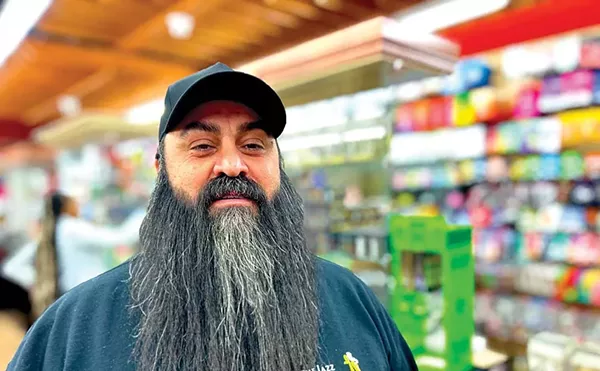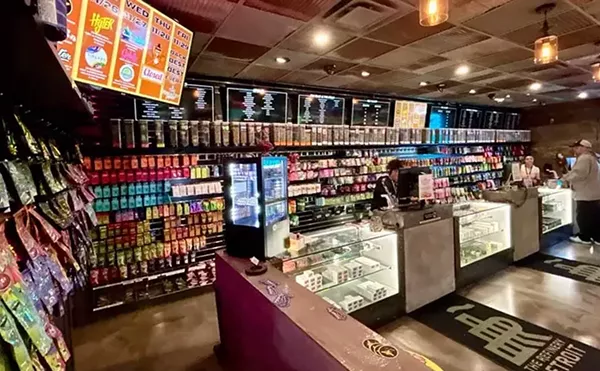
Audio By Carbonatix
[
{
"name": "GPT - Leaderboard - Inline - Content",
"component": "35519556",
"insertPoint": "5th",
"startingPoint": "3",
"requiredCountToDisplay": "3",
"maxInsertions": 100,
"adList": [
{
"adPreset": "LeaderboardInline"
}
]
}
]
The Detroit Grass Station (DGS), inside a former gas station on East Grand Boulevard, is probably among those destined to close their doors. Open only about 18 months, the DGS is about 900 feet from a park and according to city rules, all such businesses have to be at least 1,000 feet away from parks, schools, day care centers, churches, and any place selling a controlled substance, including liquor stores. The owners applied for certification and it was rejected. Playgrounds are designated Drug Free Zones and any facility that wants to operate within 1,000 feet of one must apply for a variance. The DGS has applied for a variance, but its owners don't expect that to happen.
"It sounds like everybody is getting closed down," says owner Nils Hanson. "From what I've heard it's not very likely that we'll get approved."
According to a report issued by the office of City Council President Brenda Jones, the city has received 58 appeals from facilities in Drug Free Zones — 48 have been denied and 10 approved. The meeting to decide the DGS appeal is still pending. Hanson and his partners have laid the groundwork in their community to garner support for their location. The team held a backpack drive for local schools within five months of opening the shop, started a dialogue with the local police precinct (contributing and participating in the National Night Out police-community relations effort), and even cut down dead trees in some area parks. When seeking their location, before the city ordinance was announced, they sought a location that was 500 feet away from parks and schools because that was the standard for liquor licensing. Unfortunately that distance got doubled for cannabis.
"Our first and top priority was to get all our neighbors and the local community on board," Hanson says. "We will have the entire community show up to our hearing; people want us to stay here, I don't know it that will matter. We're not drug dealers, hopefully we can stay here."
The city ordinance allows for up to a 20 percent variance on the 1,000 feet buffer zone. That means some places could be as close as 800 feet from some designated institutions. However the Metropolitan Detroit Community Action Coalition, an anti-marijuana group, opposes variances and gets its supporters to these hearings to speak against them. It will be interesting to see what appeals will be effective when the DGS appeal comes up.
"A lot of client base are from the Veterans Administration hospital," Hanson says. "We will be the most unique appeal hearing. We are definitely different than anybody else, as far as our relationship with community."
In the meantime DGS is hoping for the best and planning for the worst. That includes seeking an alternative location in a light industrial area on the southwest side. The Detroit Medical Marihuana Caregiver Centers ordinance is a little more relaxed about locations that are more out of the way. But even that is only a part of the scope that DGS principles are envisioning for themselves.
The group is involved in a house remodeling project in Highland Park, where they intend to create a green sustainable home. That will involve thermal heating and solar panels to cover the vast majority of heating and electrical needs as an example of what could be the future for Highland Park. That first home is slated to be rented as low-income housing.
"There is serious potential in Highland Park," Hanson says. "All of us are idealists — a lot of us are socialists at heart — but it's hard to do in the current political environment. Weed is a taboo word; a lot of people have a seriously hard line stance on it, but there are a lot of benefits to be in this industry. We're not just out for ourselves and we're trying to better everything around us and that makes us better."
The four DGS owners have a conglomeration of skills to support these dreams. They have backgrounds in welding and construction, plumbing, contracting, food importing and accounting.
"If we wanted something done it usually meant we learned how to do it," says Hanson.
Apparently this isn't a bunch of stoners with couch lock. They put a lot of irons in the fire and have been involved in redevelopment projects in the Rivertown area. They're not rich folks throwing cash around. The Highland Park house project has been shut down for the winter because they don't have the money to continue during the cold months. And while they may have socialist tendencies, they do want to make money. But they are serious about the medical marijuana business.
The DGS facility is a relatively small place. The original gas station was obviously built before filling stations decided to augment income by attaching themselves to convenience stores. It's neat and clean with cases displaying buds, oils, and a few other things folks can use. They take their medical marijuana mission seriously.
I've walked into several Detroit dispensaries and started asking questions about their products from a medical standpoint. Most folks at the counters aren't overly knowledgeable. In fact, I have been asked to leave some places when I started asking too many questions.
"The beautiful thing about medical marijuana is that is it's constantly evolving," says Hanson. "You have to keep learning. We have in my opinion the best staff in the city if not the state of Michigan. They're very, very knowledgeable. We are constantly online doing research of different things that we have in house and what those benefits are. We do the best we can, work with the best growers that we can, everybody who is above board. We seek protocols for our patients and we get everything tested."
If Hanson' portrayal of the place is accurate, then it sounds like this is the good model for medical marijuana facilities going forward. Actually it seems a good model for any kind of business to engage their neighbors and the community — to be more than just there to suck money out of the area.
It remains to be seen if the spot will be allotted to continue operating. If not, this group has a plan B and probably a plan C and D in their pockets.
CBD follies
The cannabinoid CBD has been on a roll the past few years since it has been found to help people suffering from epilepsy — and doesn't get you high. Some states that oppose medical marijuana, or at least the THC part, passed laws allowing extracts containing CBD. Numerous products, such as skin creams and medicinal oils, have been advertised as being legal in all 50 states. Those days seem to be over, and an ominous message regarding the government attitude toward marijuana. Last week the Drug Enforcement Administration issued a new rule called "Establishment of a New Drug Code for Marihuana Extract" that seems to make CBD or any cannabinoid illegal illegal Schedule 1 drugs — even if it comes from the low-THC, doesn't-get-you-high hemp plant.
Hmmm, is that the direction we're going with the new administration in Washington?






